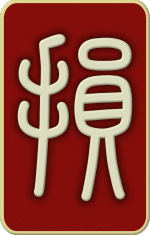
损 Sǔn Decrease (Diminution) [hexagram 41]


Mountain over Lake
 Earth element
Earth element
Lunar month: 7 ; Host (controlling) line : 5
The Decision
Declining – with sincerity there will be good fortune and no blame. Perseverance gives advantage in any undertaking. How can it be used? A pair of bamboo trays would be a suitable offering.
The lower diminishes but the upper grows; this will benefit what is above. ‘With sincerity there will be good fortune and no blame. Perseverance gives advantage in any undertaking. How can it be used? A pair of bamboo trays would be a suitable offering’ – the whole decision relies on offering the baskets at the appropriate time. Sometimes the strong need to be diminished and the weak strengthened. Diminution and growth, abundance and shortage – these all take place at the due time.
损: 有孚, 元吉, 无咎, 可贞, 利有攸往. 曷之用, 二簋可用享. Sǔn: yǒu fú, yuán jí, wú jiù, kě zhēn, lì yǒu yōu wǎng. hé zhī yòng, èr guǐ kě yòng xiǎng.
彖传: 损, 损下益上, 其道上行. 损而有孚, 元吉, 无咎, 可贞, 利有攸往. 曷之用?二簋可用享; 二簋应有时. 损刚益柔有时, 损益盈虚, 与时偕行. Tuàn zhuàn: Sǔn, sǔn xià yì shàng, qí dào shàng xíng. sǔn ér yǒu fú, yuán jí, wú jiù, kě zhēn, lì yǒu yōu wǎng. hé zhī yòng? èr guǐ kě yòng xiǎng; èr guǐ yīng yǒu shí. sǔn gāng yì róu yǒu shí, sǔn yì yíng xū, yǔ shí xié xíng.
The Image
Lake at the foot of a mountain forms ‘Decrease’. The wise therefore control their temper and restrain cravings.
象传: 山下有泽, 损; 君子以惩忿窒欲. Xiàng zhuàn: Shān xià yǒu zé, sǔn; jūn zǐ yǐ chéng fèn zhì yù.
Line Change 1
Pausing work and rushing to give aid. No fault but reflect on what is in decline.
‘Pausing work and rushing to give aid’ – joining in mutual support.
初九: 巳事遄往, 无咎, 酌损之. Chū jiǔ: sì shì chuán wǎng, wú jiù, zhuó sǔn zhī.
象传: 巳事遄往, 尚合志也. Xiàng zhuàn: Sì shì chuán wǎng, shàng hé zhì yě.
Line Change 2
Remaining steadfast brings advantage but proceeding rashly brings misfortune. Bringing about increase in others without decrease in oneself.
‘Remaining steadfast brings advantage’ – the central position heightens determination.
九二: 利贞, 征凶, 弗损, 益之. Jiǔ èr: lì zhēn, zhēng xiōng, fú sǔn, yì zhī.
象传: 九二利贞, 中以为志也. Xiàng zhuàn: Jiǔ èr lì zhēn, zhōng yǐ wéi zhì yě.
Line Change 3
Three people journey together, one is lost. Walking alone will find a friend.
‘Walking alone will find a friend’ – when there are three, uncertainty arises.
六三: 三人行, 则损一人; 一人行, 则得其友. Liù sān: sān rén xíng, zé sǔn yī rén; yī rén xíng, zé dé qí yǒu.
象传: 一人行, 三则疑也. Xiàng zhuàn: Yī rén xíng, sān zé yí yě.
Line Change 4
Diminishing illness, others hasten to celebrate. No blame.
‘Diminishing illness’ – a cause for joy.
六四: 损其疾, 使遄有喜, 无咎. Liù sì: sǔn qí jí, shǐ chuán yǒu xǐ, wú jiù.
象传: 损其疾, 亦可喜也. Xiàng zhuàn: Sǔn qí jí, yì kě xǐ yě.
Line Change 5
An offer of ten pairs of tortoise shells cannot be refused. Supreme opportunity.
The ‘Supreme opportunity’ comes from a heavenly blessing.
六五: 或益之, 十朋之龟弗克违, 元吉. Liù wǔ: huò yì zhī, shí péng zhī guī fú kè wéi, yuán jí.
象传: 六五元吉, 自上佑也. Xiàng zhuàn: Liù wǔ yuán jí, zì shàng yòu yě.
Line Change 6
Advancing others without detriment. Not a mistake. Steadfastness brings good fortune. Any undertaking is favorable. Abundant assistance will come.
‘Advancing others without detriment’ – deservedly attaining objectives.
上九: 弗损益之, 无咎, 贞吉, 有攸往, 得臣无家. Shàng jiǔ: fú sǔn yì zhī, wú jiù, zhēn jí, yǒu yōu wǎng, dé chén wú jiā.
象传: 弗损益之, 大得志也. Xiàng zhuàn: Fú sǔn yì zhī, dà dé zhì yě.
The full set of 64 English translations is available in our new book 'Book of Changes - Deciphered' ➚.